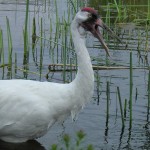
13 endangered whooping cranes now call Wheeler NWR their winter home–maybe permanently–thanks to the quirks of weather, FAA rules and bird stubbornnes.
Keep reading Whooping cranes may make AL home after fluky weather and FAA rules dispute
 13 endangered whooping cranes now call Wheeler NWR their winter home–maybe permanently–thanks to the quirks of weather, FAA rules and bird stubbornnes. Keep reading Whooping cranes may make AL home after fluky weather and FAA rules dispute 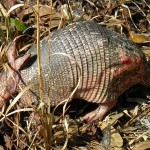 About one-third of Americans who get leprosy can probably blame their contact with a coastal armadillo. Doctors linked their strain to the armadillo while other patients had overseas varieties. About half remembered armadillo contact, typically hunting and eating. Keep reading Armadillo contact (like hunting) linked to 1 in 3 US leprosy cases  For $7,000, a company will get you a tame fox, product of a famous Russian breeding experiment into domesticating animals. You can get one directly for $4,000, but you have to manage all the exotic animal licenses. Keep reading Russians will send you a tame fox puppy for $4k–or $7k if they handle the paperwork 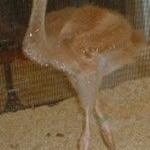
Baby picture of Crane # 412, 2004-2011 Hunters kill 4th endangered Whooping Crane in 2 months. This bird, #412, learned to migrate by following an ultralight aircraft from Necedah, WI to Cherokee County, AL. Last year his chick disappeared. Hunters killed three whoopers in GA this winter. Less than 600 survive. The bird was discovered Jan. 28–two days before the end of waterfowl hunting season. The main hunting area in Cherokee is the Little River National Preserve, which got national parks funding and designation in 1992, but with the special exception that hunting be allowed there. Great idea. Chattanooga Times Free Press Rare and freaky blanket octopus spotted octopus off Florida. It’s red, huge and has cape-like arms. People rarely see these regular residents, which live far off shore when the Gulf Stream isn’t acting funny. JustNews.com via Scienceblogs Michigan wants to ban wildlife rehabiliators from helping sick or injured mute swan. They want to restore the native trumpeter swan, instead. MLive Israel tests bomb-sniffing mice for airline passengers. Om Dagens Nyheter Leaked report shows Tanzania’s road through the Serengeti would carry a million cars a day. The road would cut off the migration of elephant, zebra and wildebeest, the country’s main economic engine. Chicago Tribune Obama administration says, sure, walruses deserve endangered species protection, but they won’t get it. LATimes  From New York to California, families are heading out to watch bald eagles at festivals. Winter forces the raptors to hunt over unfrozen water. Keep reading Eagle Watching Festivals for 2011 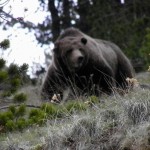 AZ company invents high-tech taser for attacking grizzlies; shoots 35 feet. TN and AL get new crayfish species. Keep reading Wildlife taser; DC keeps adorable pandas & a tour of other animal news 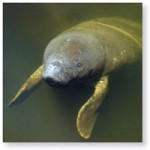 Manatee, by Florida Fish and Wildlife Research Institute So far no manatee has turned up oiled after the BP Deepwater Horizon oil spill earlier this year. But 656 of the goofy, endangered marine mammals have turned up dead, according to the latest statistics from the Florida Fish and Wildlife Commission. That’s a devastating 13% of the population. The biggest problem was a cold spell last winter, but we may never know if or what role the oil had. Cathy Beck, who manages the Manatee Individual Photo-identification System (MIPS), says the oil spill was “extremely worrisome,” but so far no oiled manatees in the area where the oil spread. Their next concern is that the remaining oil will seep into the seagrass manatees eat. They’ll be on the lookout for any oil or dispersant residue this winter when they capture 10 or so (as they do each year) and give them a physical, including testing blood and tissue samples. Defenders of Wildlife, Save the Manatees and other wildlife groups sued BP saying they violated the Endangered Species Act by harming the 27 threatened or endangered species that live in the gulf. Save the Manatees says that the big problem was the cold weather at the beginning of the year, which also lead to spectacular photos and record manatees counts (5,076) as the manatees crowded around natural springs and power plants to stay warm. “In total, more than 300 manatees are believed to have died from this lingering event, shattering the previous Keep reading Manatees Not Showing Oil, But Dying a Lot  Loggerhead sea turtle hatchlings are swimming off into Alabama’s gulf coast again. After the BP oil spill, they were moved to FL. Now the water’s safe enough. Keep reading AL Gulf Water Safe Enough for Baby Turtles  A network of turtle volunteer groups have the data to make decent map of every turtle nest in the gulf, including species and probable hatching time. Keep reading Turtle Volunteers’ Vast Map of Gulf Nests Aids in Emergency Transplant Out of BP Oil  One peculiar thing about the Deepwater Horizon oil spill so far: hardly any wildlife covered in oil. The lack of oiled birds has mystified rescuers and exasperated the media. TV networks are clamoring for images, showing clip files and giving the impression that tons of animals are showing up hurt. That’s not so–at least not yet. Mike Ziccardi, a vet and director of the Oiled Wildlife Care Network, says on the OWCN blog that he got into a spat with “a fairly irate reporter from a major national news outlet” who demanded video access to the necropsy (animal autopsy) of some sea turtles. The network were desperate for dead turtle images even though the turtles didn’t show initial signs of oiling and, as Ziccardi pointed out, were in found in a time and place typical of stranded turtles. (The other big threat to turtles is shrimp boats, Wallace Nichols from Grupo Tortuguero points out.) Keith Olbmermann started a broadcast this week in ominous tone about “as dead jellyfish begin to wash up on the Mississippi coast.” Dead jellyfish might be the one bright spot of the oil spill, given that the Gulf Dead Zone has caused a plague of jellyfish in the gulf. A brown pelican is only second bird to be treated. Photo by IBRRC Apparently California Gov. Arnold Schwarzenegger so expected oiled wildlife images that he dreamed some up. He just announced that he was withdrawing support for drilling off California’s shores: “I see Keep reading Where Are All Those Oil-Soaked Birds We Were Expecting? |
|
|
Copyright © 2024 AnimalTourism News - All Rights Reserved |
|
Recent Comments